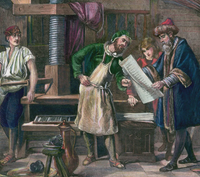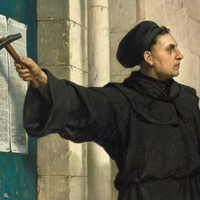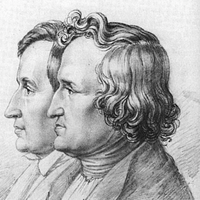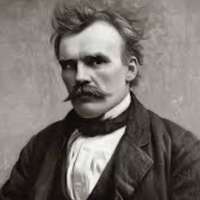German Language and Culture
Important German Thinkers
---
Denn ein Herz, das sucht, fühlt wohl, daß ihm etwas mangle; ein Herz, das verloren hat, fühlt, daß es entbehre.
For a heart that is searching, senses that something is lacking; a heart that has lost, feels the abyss of deprivation.
Johannn Wolfgang von Goethe in "Wahlverwandtschaften" (English: Elective Affinities)
---
I researched important persons from German culture. Typical persons I researched were the following people, with a deeper focus on those who were of pivotal importance for language, literature and culture:
Johann Wolfgang von Goethe was the most famous German poet and writer of all times, comparable in standing with the famous William Shakespeare. He wrote many well-known books like "Faust", "Die Leiden des Jungen Werthers" or Goetz von Berlichingen. Goethe, who later became a politician in Saxony, visited Wartburg castle more than once and was actually the one who started restoring the Wartburg castle were Luther translated the Bible. | J.W. von Goethe 1749-1832 | Johannes Gutenberg is the man who enabled the world as we know it today. Before his invention, books had to be written by hand in monasteries and cost so much, that only the very rich could afford them. When Johannes Gutenberg invented the printing press, he changed that. Even movements like the Reformation would not have been possible without the printing press as it allowed pamphlets with new ideas to rapidly spread everywhere. | Johannes Gutenberg lived from circa 1400 and died 1468 in Mainz |
Martin Luther 1483-1546 | Martin Luther traveled through the woods in a thunder storm and pledged his life to God to become a monk in peril of his life. He noticed things that were wrong in the Roman Catholic Church, like indulgences and put his 95 thesis on the Wittenberg castle Church to make this known. The Pope banned him, and his reformation led to a schism and the protestant church. He became "father" of the common German language though his German Bible translation. | J. 1785-1863 & Wilhelm 1786-1859 | We know them from folk stories and fairy tales they collected, but Jacob was a German linguist and professor in Göttingen and Berlin. He developed Grimm's law, the First Germanic sound shift, which describes how the spoken sound changed during the development of Proto-Germanic in the first millennium B.C. When Luther arrived in Marburg to debate Zwingli, he stayed at the house where the Grimm brothers would later live, until called to the castle. |
Immanuel Kant was one of the greatest minds of all times. This philosopher was central to the Enlightenment and his work "Critique of Pure Reason" revolutionized epistemology and metaphysics. He also postulated the nebular hypothesis, the Milky Way as a galaxy and had one of the first theories about the origin of earthquakes. He thaught many such subjects at university level. His impact continues to shape philosophical discourse today. | Immanuel Kant 1724-1804 | Bonhoeffer was a minister who voluntarily went back to Nazi Germany to lead a secret seminary for Confessing Church pastors and took a stance against the regime. He was incarcerated from 1942 and wrote some of his most impressive poetry incarcerated: "Stations on the Road to Freedom" and his last poem "The powers of good". His last words to his cell mate before his hanging on April 9th 1945. "This is the end, for me the beginning of life". | Dietrich Bonnhöfer 1906-1945 |
Friedrich Nietzsche 1844-1900 | Nietzsche was a renowned philosopher who challenged conventional thinking with his critique of morality, and human nature. Nietzsche had mental health problems, but his ideas, including the concept of the "Ubermensch" and existentialist and nihilist philosophy influence thinkers until today. In his later years, he ended in a mental asylum leaving behind works like "Thus Spoke Zarathustra" and "Beyond Good and Evil". | Arthur Schopenhauer 1788-1860 | Arthur Schopenhauer was a prominent German philosopher, who was best known for his pessimistic worldview and insights into the nature of existence. He famously described life as a constant struggle dominated by suffering, which he wrote about in his major work: "The World as Will and Representation". Arthur Schopenhauer's philosophy heavily influenced existentialist thinkers such as Friedrich Nietzsche and Siegmund Freud. |
---
Daher kann und will ich nichts widerrufen, weil wider das Gewissen etwas zu tun weder sicher noch heilsam ist. Gott helfe mir, Amen!
Therefore I cannot and will not recant anything, for to go against conscience is neither safe nor beneficial. So help me God, Amen!
Martin Luther, before the Diet of Worms (Reichstag in Worms)
---
Other important Germans that I have learned about:
- Friedrich I. Barbarossa
- Albertus Magnus
- Albrecht Dürer
- Alexander von Humboldt
- Johannes Kepler
- Friedrich Schiller
- Johann Sebastian Bach
- Wolfgang Amadeus Mozart
- Nikolaus Kopernikus
- Ludwig von Beethoven
- Robert Koch
- Friedrich II., der Große
- Heinrich Heine
- Wilhelm Conrad Röntgen
- Alexander von Humboldt
- Levi Strauss
- Konrad Duden
- Richard Wagner
- Otto von Bismarck
- Otto Lilienthal
- Hermann Hesse
- Thomas Mann
- Sigmund Freud
- Bertolt Brecht
- Albert Schweitzer
- Heinrich Böll
- Oskar Schindler
- Albert Einstein
- Wernher von Braun
Field trips
I visited the Weimar, where Goethe lived and worked and the Wartburg castle, which is a UNESCO world heritage site, where Martin Luther wrote the German Bible translation the "Lutherbibel" in 3 months after he was "kidnapped" by some of his friends to save him from persecution by the governing powers.




















